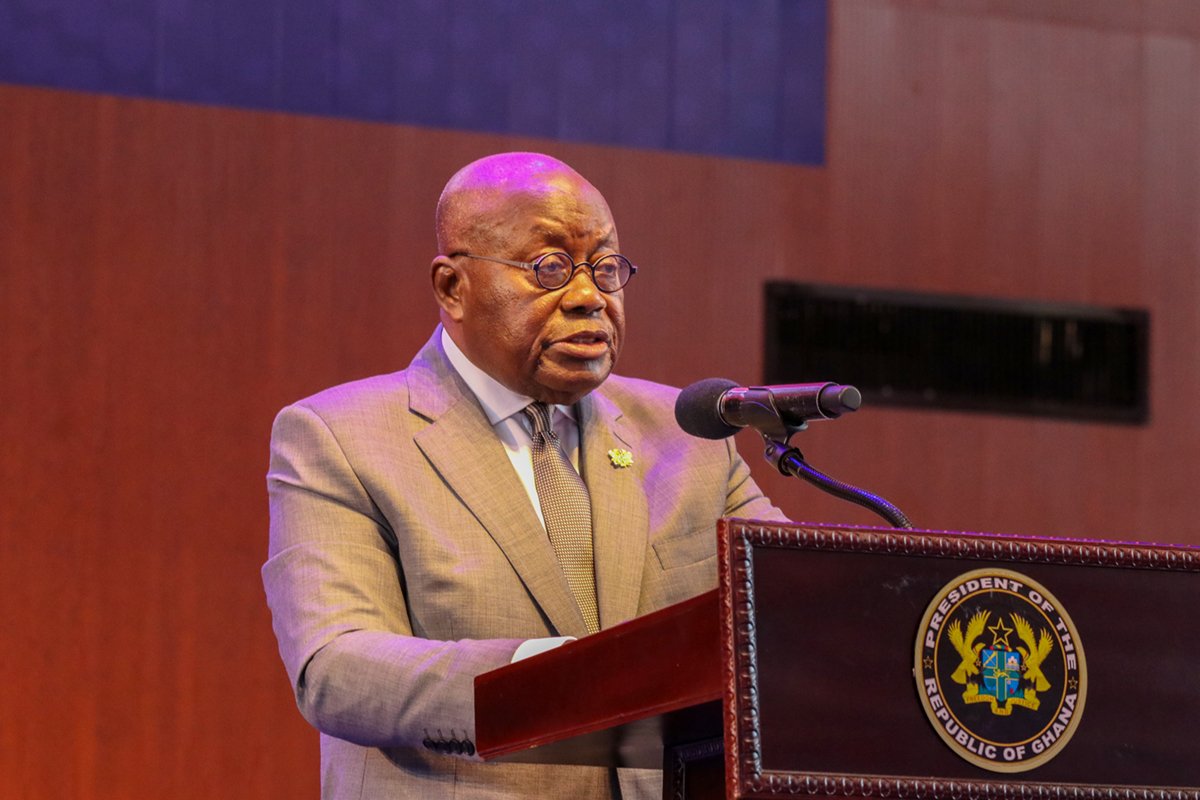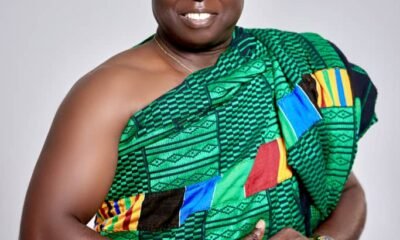News
National Action Plan to combat misinformation before cabinet – President Akufo-Addo

At the Ghana Report Summit held today on August 1, 2024, President Nana Addo Dankwa Akufo-Addo revealed that a comprehensive National Action Plan, aimed at combating misinformation and disinformation in the lead-up to the 2024 General Elections, is currently before Cabinet for its consideration and action.
In his address, President Akufo-Addo praised Ghana’s impressive democratic journey, marked by eight successful general elections since the return to constitutional rule in 1993.
However, he cautioned that misinformation and disinformation pose significant threats to these democratic achievements. “False narratives can distort public perception, undermine trust in our institutions, and even incite violence,” the President warned.
The digital age has transformed how information is shared and consumed, offering both opportunities and challenges. Social media platforms, while beneficial in many ways, have become hotbeds for the rapid spread of false information.
President Akufo-Addo noted that misinformation and disinformation can distort public perception of candidates and political parties, leading to uninformed decision-making at the polls. Disinformation campaigns often exploit societal divisions, amplifying existing tensions and risking social cohesion.
To counter these threats, President Akufo-Addo announced the development of a National Action Plan, which is currently before the Cabinet for consideration. This detailed plan outlines strategic steps to combat the spread of false information and protect democratic processes. The Action Plan aims to safeguard the integrity of elections, promote an informed and engaged citizenry, and ensure that misinformation and disinformation do not undermine Ghana’s hard-won democratic gains.
The National Action Plan includes several key initiatives:
Strengthening Regulatory Frameworks: The government is enhancing legal and regulatory frameworks to hold individuals and organizations accountable for spreading false information. This will involve stricter penalties for those found guilty of disseminating misinformation and disinformation.
Collaborating with Technology Companies: The government is working with social media companies and other tech firms to develop mechanisms for monitoring and curbing the spread of false information. These partnerships are crucial in the fight against digital misinformation and disinformation.
Public Awareness Campaigns: Nationwide campaigns will be launched to educate citizens about the dangers of misinformation and disinformation. These campaigns will promote media literacy, empowering voters to make informed decisions and recognize and reject false information.
Supporting Fact-Checking Organizations: Fact-checking organizations play a vital role in verifying information and debunking false claims. The government will provide support to enhance their capacity and reach.
In his address, President Akufo-Addo stressed the need for all political actors to commit to truthfulness and transparency in their campaigns. The spread of false information for political gain undermines the democratic process and erodes public trust. Political parties and candidates must engage in constructive dialogue, presenting their ideas and policies to the electorate in a truthful and respectful manner.
Civil society organizations are invaluable in promoting transparency, accountability, and media literacy. Their advocacy efforts are essential in curbing misinformation and disinformation. The public also plays a crucial role by verifying information before sharing it and relying on reputable news sources.
The National Action Plan represents a significant step forward in addressing the challenges posed by misinformation and disinformation. As Ghana prepares for the 2024 General Elections, implementing this plan is essential to ensure that the elections are conducted with truth and integrity. By working together – government, media, civil society, and the public – Ghana can create an environment where truth prevails, and its democracy thrives.
President Akufo-Addo’s address at the Ghana Report Summit was a clarion call to action. As Ghana approaches the 2024 General Elections, the fight against misinformation and disinformation is paramount. By working together, Ghana can ensure that its elections reflect the true will of the people, preserving the nation’s reputation as a beacon of democracy and stability in Africa.
News
Damango wages war on shisha smoking among minors

Troubled and anxious citizens in Damongo of the Savannah Region have expressed concerns about the number of young people, believed to be under the age of 18, involved in ‘shisha’ smoking in pubs and drinking spots within the township.
Eyewitnesses say the minors were seen patronising nightlife venues, where Shisha smoking happen in the open.
The situation has sparked renewed public concern over the enforcement of child protection laws and regulations governing the operations of entertainment centres in the municipality and country as a whole.
An eyewitness, who spoke to The Spectator on conditions of anonymity for security reasons, noted that the situation was becoming increasingly common.
“This is not a one-off incident. It is becoming very common, but residents like us cannot openly report or speak about it because our lives will be at risk,” he said.
Under Ghanaian law, minors were prohibited from patronising Shisha.
Public health experts have consistently warned that shisha use exposes users to harmful substances that can negatively affect brain development, respiratory health, and overall well-being, particularly among young people.
The residents believe the alleged incidents point to broader challenges relating to youth supervision, substance abuse, and weak enforcement of existing regulations and have called on municipal authorities, security agencies, and regulatory bodies to intensify monitoring of pubs and entertainment centres to ensure compliance with the law.
In an effort to address the menace, Mr Salisu Be-Awurbi, the Savannah Regional Minister, has led public education campaigns, engaged security agencies, and supported enforcement actions to address the rising use of illicit substances in the region.
Wura Kelly Seidu Boresah I, the Chief of Damongo, has also called on all stakeholders including parents, community leaders, institutions, and young people to actively support efforts to curb drug abuse, warning that the rising consumption of hard drugs poses a serious health threat to the future of the youth in the Savannah Region.
He also cautioned individuals involved in the sale and distribution of illicit drugs to immediately desist from the practice, stressing that offenders will face arrest and prosecution in accordance with the law.
From Geoffrey Buta, Damongo, Savannah Region
Join our WhatsApp Channel now!
https://whatsapp.com/channel/0029VbBElzjInlqHhl1aTU27
News
Ga Mantse endorses initiative to end domestic voilence

Dr Theresa Baffour, an advocate for ending violence and Chief Executive Officer (CEO) of SAHM SAHW Foundation, has said that society plays a critical and pivotal role in breaking the cycle of domestic violence.
According to her, domestic violence is a major contributor of making women, who are mostly the victims, mentally derailed and unable to engage in economic activities.
She said this when the foundation called on the Ga Mantse, Nii Tackie Teiko Tsuru II, to solicit support for the initiative by the “Strong and Healthy Minds, Strong and Healthy Women” (SAHM SAHW) to combat domestic violence within the Ga State.
The visit was occasioned by the fact that domestic violence cases have become quite prevalent in the Ga communities and is retarding growth.
According to her, the canker was an impediment to national development because the victims were usually tortured and would have to go through series of therapies to return to the right state of mind.
Dr Baffour mentioned that Gender-Based Violence (GBV) places a mental toll on women, and was, therefore, important to break the cycle through comprehensive mental health support, crisis intervention and empowerment programmes in communities with high rates of GBV.
This intervention, she underscored, would help in empowering the denigrated victim of domestic violence to soundly heal, build and thrive.
Dr Baffour added that the initiative would provide holistic, trauma-informed mental health care and advocacy for young women affected by domestic violence.
According to her, the above statement would create safe spaces for healing and equipping them with entrepreneurial skills for renewed hope and empowered life.
The Ga Mantse pledged his support for the laudable initiative to combat domestic violence and also acknowledged the need to address it in the Ga State.
Further endorsement came from Justice Julia Naa-Yarley Adjei Amoah, Chief of Staff at the Office of the Ga Mantse, as she commended the team of SAHM SAHW Foundation for taking a bold step to end the canker in the Greater Accra.
She added that it was a step in the right direction to save vulnerable women from torture, stress and emotional abuse.
By Alfred Nii Arday Ankrah














